经济学人文章翻译
如何养活世界(来自经济学人的英语阅读精品,含翻译)
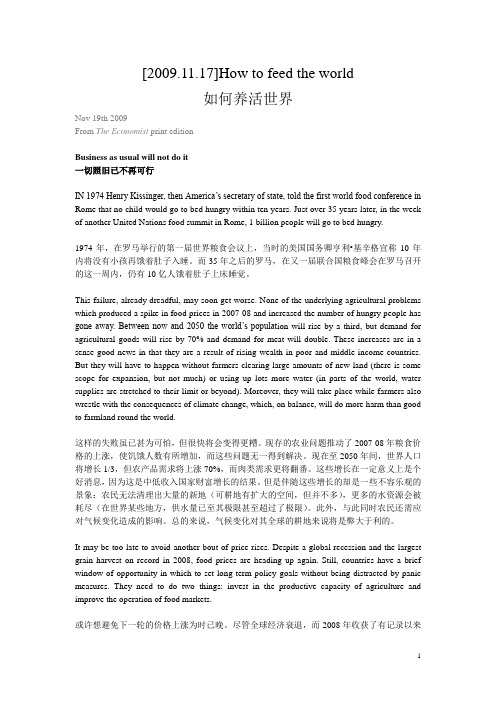
[2009.11.17]How to feed the world如何养活世界Nov 19th 2009From The Economist print editionBusiness as usual will not do it一切照旧已不再可行IN 1974 Henry Kissinger, then America’s secretary of state, told the first world food conference in Rome that no child would go to bed hungry within ten years. Just over 35 years later, in the week of another United Nations food summit in Rome, 1 billion people will go to bed hungry.1974年,在罗马举行的第一届世界粮食会议上,当时的美国国务卿亨利•基辛格宣称10年内将没有小孩再饿着肚子入睡。
而35年之后的罗马,在又一届联合国粮食峰会在罗马召开的这一周内,仍有10亿人饿着肚子上床睡觉。
This failure, already dreadful, may soon get worse. None of the underlying agricultural problems which produced a spike in food prices in 2007-08 and increased the number of hungry people has gone away. Between now and 2050 the world’s populat ion will rise by a third, but demand for agricultural goods will rise by 70% and demand for meat will double. These increases are in a sense good news in that they are a result of rising wealth in poor and middle-income countries. But they will have to happen without farmers clearing large amounts of new land (there is some scope for expansion, but not much) or using up lots more water (in parts of the world, water supplies are stretched to their limit or beyond). Moreover, they will take place while farmers also wrestle with the consequences of climate change, which, on balance, will do more harm than good to farmland round the world.这样的失败虽已甚为可怕,但很快将会变得更糟。
外刊每日精读 Japanese literature

外刊每日精读 | Japanese literature文章脉络【1】村田沙耶香自幼就被父母灌输“女德”【2】村田沙耶香在小说中隐射自己的遭遇【3】日本文学翻译步入了新时代【4】几本书里探讨了家庭生活的问题【5】村田沙耶香关于母性的观点【6】日本作者认为女性不应成为生育机器【7】作家在书中对女性的描写越发胆大【8】以男性的视角看待这些书籍会很有帮助经济学人原文Japanese literature:A world of their ownReaders in the West are embracing Japan’s bold women authors【1】Murata Sayaka has long kept company with imaginary friends. She first conjured them up as a child, while enduring bullying at school and hectoring at home. Her parents forced her to practise cooking and encourag ed “girlie” behaviour, thinking that would one day help attract a rich husband. “I didn’t feel like my body, my life, belonged to me,” Ms Murata says. She dreamed of flying away, ona spaceship with her fantasticalcompanions, to a planet where she would belong.【2】Throughout her fiction, Ms Murata questions what it means to be “normal” and writes sceptically about family life. Her work has struck a chord in Japan,her conservative home country. Her semi-autobiographical novel, “Convenience Store Woman”, wo n the prestigious Akutagawa literary prize in 2016. It has since been translated into more than 30 languages and sold over 1.5m copies.【3】Ms Murata’s work has helped usher in a new era ofJapanese literature in translation. “Convenience Store Woman” came out in English in 2018and its feminist undertones may have resonated amid the #MeToo movement, thinks Ginny Tapley Takemori, its translator. In 2020“breasts and Eggs”, a novel about pregnancy and beauty standards by Kawakami Mieko, another female Japanese author, also became an international bestseller. “Publishers used to ask for the next Haruki Murakami,” says David Boyd, a translator who has worked on Ms Kawakami’s books. “Now they ask: What’s going to be the next ‘Convenience Store Woman’?”【4】Though the settings may be unfamiliar to Western readers, thesebooks examine universal themes, such as the challenges of family life. In “Weaselsin the Attic” (2022), a novella made up of interlinking stories, OyamadaHiroko portrays an unhappily married couple who seek fulfilment by having a baby. “In Japan, it seems as if women are seen as incomplete unless they have a child,” says Ms Oyamada. Her short story “Spider Lilies” explores the related obsession withbreastfeeding. “When I had a baby, I felt like my breasts were a public asset,” the author says. “Strangers kept asking me: ‘Is the milk coming?【5】Ms Murata’s view of motherhood is even more caustic. The women inher fiction are often “monstrous”. In “Nothingness”, a short story, thefemale protagonist is incapable of maternal affection. Ms Murata once hoped her own mother would shower her with unconditional love. She now says the mother-daughter relationship usually involves “beautified abuse”.【6】Today’s literary stars belong to a long lineage of feminist writing in Japan. In the 1970s, amid anti-war and anti-capitalist feminist movements, the child-killing mother became a popular trope in fiction by Japanese women, says Iida Yuko of Nagoya University. Novelists including Oba Minako and Kono Taekoused disturbing imagery to rebel against a view of women as baby-making machines. Bookish types hope the new overseas interest in Japanese writers will extend to this period, too.【7】Yet the likes of Ms Murata are breaking new ground intheir bold depictions of sexuality. “Growing up and dating men, I never thought women could be sexual agents,” she says, noting that Japanese popular culture idealises subservient women. Her characters are aroused by things suchas stuffed toys and curtains: whereas heterosexual love often turns into a “manual”,intimacy with objects is more “creative”, she writes in “Vanishing World”, a sci-fi tale of a world where people breed through artificial insemination. “There’s always a hierarchy between man and woman,”echoes Ms Oyamada. In “Lost in the Zoo”, a short story, she likens unhappy familiesto caged animals, trapped by convention. A lesbian couple, by contrast, exude anair of liberty.【8】These books may be by and about women, but a man’s perspective can be useful, Ms Oyamada suggests. “When I depict men’s behaviour through the eyes of a woman, many people see it as an attack,” she says. “I can avoid that by speaking as a man.” She stages chauvinistic discussions between male characters in “Weasels in the Attic”,demonstrating their obliviousness to the demands of child-rearing. “Most men aren’t even aware of the pain they inflict on women,” she says. “It’s good that such pain is becoming more visible.”长难句:1.原文:In “Weasels in the Attic” (2022), a novella made up of interlinking stories, Oyamada Hiroko portrays an unhappily married couple who seek fulfilment by having a baby.2.分析:主句是主谓宾结构Oyamada Hiroko(主语)portrays(谓语动词)an unhappily married couple(宾语)。
经济学人两篇+翻译
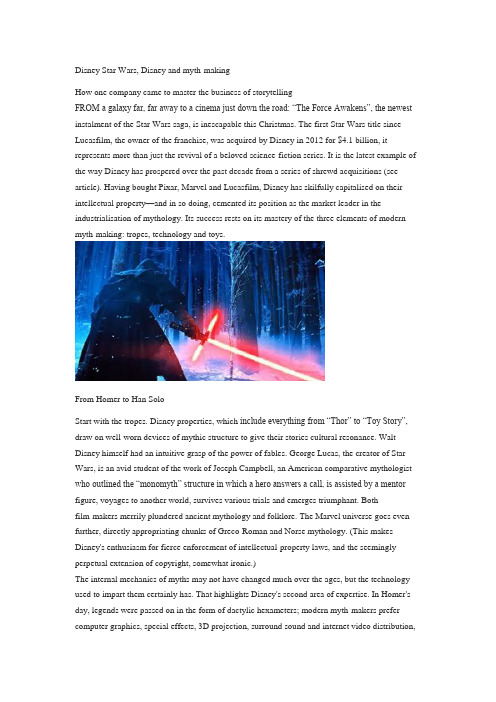
Disney Star Wars, Disney and myth-makingHow one company came to master the business of storytellingFROM a galaxy far, far away to a cinema just down the road: “The Force Awakens”, the newest instalment of the Star Wars saga, is inescapable this Christmas. The first Star Wars title since Lucasfilm, the owner of the franchise, was acquired by Disney in 2012 for $4.1 billion, it represents more than just the revival of a beloved science-fiction series. It is the latest example of the way Disney has prospered over the past decade from a series of shrewd acquisitions (see article). Having bought Pixar, Marvel and Lucasfilm, Disney has skilfullycapitalised on their intellectual property—and in so doing, cemented its position as the market leader in the industrialisation of mythology. Its success rests on its mastery of the three elements of modern myth-making: tropes, technology and toys.From Homer to Han SoloStart with the tropes. Disney properties, which include everything from “Thor” to “Toy Story”, draw on well-worn devices of mythic structure to give their stories cultural resonance. Walt Disney himself had an intuitive grasp of the power of fables. George Lucas, the creator of Star Wars, is an avid student of the work of Joseph Campbell, an American comparative mythologist who outlined the “monomyth” structure in which a hero answers a call, is assisted by a mentor figure, voyages to another world, survives various trials and emerges triumphant. Bothfilm-makers merrily plundered ancient mythology and folklore. The Marvel universe goes even further, directly appropriating chunks of Greco-Roman and Norse mythology. (This makes Disney's enthusiasm for fierce enforcement of intellectual-property laws, and the seemingly perpetual extension of copyright, somewhat ironic.)The internal mechanics of myths may not have changed much over the ages, but the technology used to impart them certainly has. That highlights Disney's second area of expertise. In Homer's day, legends were passed on in the form of dactylic hexameters; modern myth-makers prefer computer graphics, special effects, 3D projection, surround sound and internet video distribution,among other things. When Disney bought Lucasfilm it did not just acquire the Star Wars franchise; it also gained Industrial Light & Magic, one of the best special-effects houses in the business, whose high-tech wizardry is as vital to Marvel's Avengers films as it is to the Star Wars epics. And when Disney was left behind by the shift to digital animation, it cannily revitalised its own film-making brand by buying Pixar, a firm as pioneering in its field as Walt Disney had been in hand-drawn animation. Moreover, modern myths come in multiple media formats. The Marvel and Star Wars fantasy universes are chronicled in interlocking films, television series, books, graphic novels and video games. Marvel's plans are mapped out until the mid-2020s.But these days myths are also expected to take physical form as toys, merchandise and theme-park rides. This is the third myth-making ingredient. Again, Walt Disney led the way, licensing Mickey Mouse and other characters starting in the 1930s, and opening the original Disneyland park in 1955. Mr Lucas took cinema-related merchandise into a new dimension, accepting a pay cut as director in return for all the merchandising rights to Star Wars—a deal that was to earn him billions. Those rights now belong to Disney, and it is making the most of them: sales of “The Force Awakens” merchandise, from toys to clothing, are expected to be worth up to $5 billion alone in the coming year. In all, more than $32 billion-worth of Star Wars merchandise has been sold since 1977, according to NPD Group, a market-research firm. Even Harry Potter and James Bond are scruffy-looking nerf-herders by comparison.Those other franchises are reminders that Disney's approach is not unique. Other studios are doing their best to imitate its approach. But Disney has some of the most valuable properties and exploits them to their fullest potential. It is particularly good at refreshing and repackaging its franchises to encourage adults to revisit their childhood favourites and, in the process, to introduce them to their own children. This was one reason why Pixar, whose films are known for their cross-generational appeal, was such a natural fit. Now the next generation is being introduced to Star Wars by their nostalgic parents. At the same time, Disney has extended its franchises by adding sub-brands that appeal to particular age groups: children's television series spun off from Star Wars, for example, or darker, more adult tales from the Marvel universe, such as the “Daredevil” and “Jessica Jones” series on.Do, or do not—there is no tryWhat explains the power of all this modern-day mythology? There is more to it than archetypal storytelling, clever technology and powerful marketing. In part, it may fill a void left by the decline of religion in a more secular world. But it also provides an expression for today's fears.T he original “Star Wars” film, in which a band of plucky rebels defeat a technological superpower, was a none-too-subtle inversion of the Vietnam war. The Marvel universe, originally a product of the cold-war era, has adapted well on screen to a post-9/11 world of surveillance and the conspiratorial mistrust of governments, large corporations and the power of technology. Inuncertain times, when governments and military might seem unable to keep people safe or stay honest, audiences take comfort in the idea of superheroes who ride to the rescue. Modern myths also have the power to unify people across generations, social groups and cultures, creating frameworks of shared references even as other forms of media consumption become ever more fragmented.Ultimately, however, these modern myths are so compelling because they tap primordial human urges—for refuge, redemption and harmony. In this respect they are like social-media platforms, which use technology to industrialise social interaction. Similarly, modern myth-making, reliant though it is on new tools and techniques, is really just pushing the same old buttons in stone-age brains. That is something that Walt Disney understood instinctively—and that the company he founded is now exploiting so proficiently.迪士尼星球大战,迪士尼和神话创造一个公司如何成为兜售故事的商业传奇从遥远的星际抵达你周边的电影院—《星球大战7:原力觉醒》这部星战系列的最新影片就在圣诞期间上映,不容错过。
2013年考研英语真题答案及解析
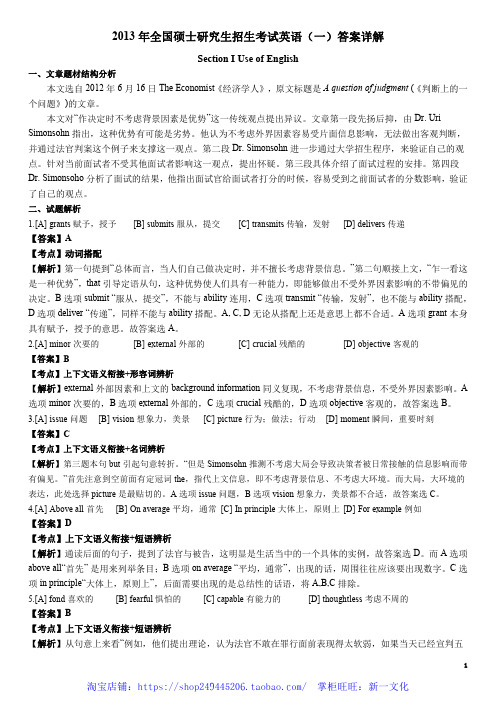
【答案】D
【考点】句间逻辑关系+固定结构
【解析】根据句内的逻辑关系,在对待犯罪行为方面害怕表现出太软弱,在……方面,关于……的表达应该用
介词 on,故答案为 D。
7. [A] if 如果
[B] until 直到
[C] though 尽管
[D] unless 除非
【答案】A
【考点】上下文语义衔接+固定短语
请者的____不应该取决于同一天随机选到的其他几名申请者。接着下文讲到面试官面试 MBA 申请者的结果
results,因此第 9 题应该也有结果的意思,与下文结合是达到正面的结果,因此答案是即“申请者的成功”。其
它选项带入原文重叠答案,与原义不符合。
10.[A] found 找到的 [B] studied 研究过的
【答案】D
【考点】上下文语义衔接+短语辨析
【解析】通读后面的句子,提到了法官与被告,这明显是生活当中的一个具体的实例,故答案选 D。而 A 选项
above all“首先” 是用来列举条目;B 选项 on average “平均,通常”,出现的话,周围往往应该要出现数字。C 选
项 in principle“大体上,原则上”,后面需要出现的是总结性的话语,将 A,B,C 排除。
D 选项 deliver “传递”,同样不能与 ability 搭配。A, C, D 无论从搭配上还是意思上都不合适。A 选项 grant 本身
具有赋予,授予的意思。故答案选 A。
2.[A] minor 次要的
[B] external 外部的
[C] crucial 残酷的
[D] objective 客观的
六名被告执行缓刑,那么他很有可能将下一个人送入监狱。A 选项 fond of 喜欢,B 选项 fear of 惧怕,C 选项
经济学人翻译
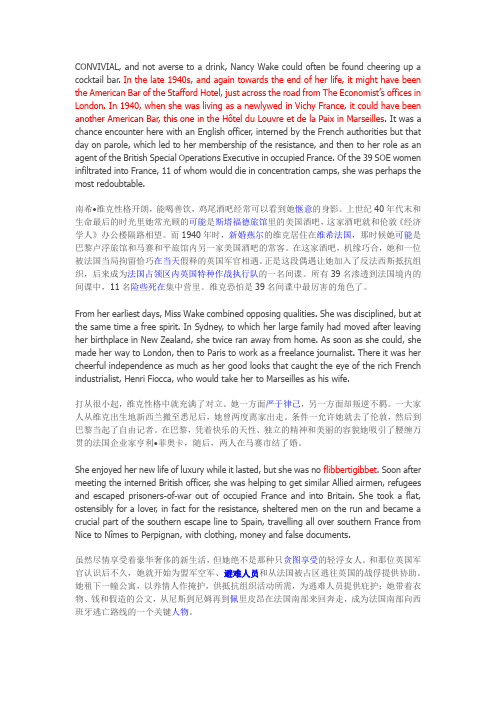
CONVIVIAL, and not averse to a drink, Nancy Wake could often be found cheering up a cocktail bar. In the late 1940s, and again towards the end of her life, it might have been the American Bar of the Stafford Hotel, just across the road from The Economist’s offices in London. In 1940, when she was living as a newlywed in Vichy France, it could have been another American Bar, this one in the Hôtel du Louvre et de la Paix in Marseilles. It was a chance encounter here with an English officer, interned by the French authorities but that day on parole, which led to her membership of the resistance, and then to her role as an agent of the British Special Operations Executive in occupied France. Of the 39 SOE women infiltrated into France, 11 of whom would die in concentration camps, she was perhaps the most redoubtable.南希•维克性格开朗,能喝善饮,鸡尾酒吧经常可以看到她惬意的身影。
(记忆版)2010全国外语翻译资格证考试英语二级笔译试题
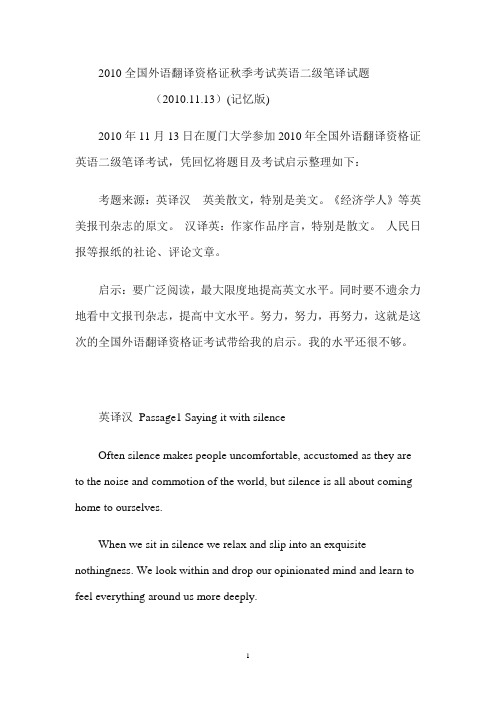
2010全国外语翻译资格证秋季考试英语二级笔译试题(2010.11.13)(记忆版)2010年11月13日在厦门大学参加2010年全国外语翻译资格证英语二级笔译考试,凭回忆将题目及考试启示整理如下:考题来源:英译汉英美散文,特别是美文。
《经济学人》等英美报刊杂志的原文。
汉译英:作家作品序言,特别是散文。
人民日报等报纸的社论、评论文章。
启示:要广泛阅读,最大限度地提高英文水平。
同时要不遗余力地看中文报刊杂志,提高中文水平。
努力,努力,再努力,这就是这次的全国外语翻译资格证考试带给我的启示。
我的水平还很不够。
英译汉Passage1 Saying it with silenceOften silence makes people uncomfortable, accustomed as they are to the noise and commotion of the world, but silence is all about coming home to ourselves.When we sit in silence we relax and slip into an exquisite nothingness. We look within and drop our opinionated mind and learn to feel everything around us more deeply.Often it happens that when we wait in silence, life rushes back to fill those crevices in our souls. There are times when silence becomes the most potent way of communication and is more effective than words.Lovers all over the world are said to communicate with silence. Understand each other‟s silence. The famous telepathy between two people who have strong feelings for each other happens in a compelling silence.Undeniably, silence needs a special kind of power and authority of mind and saying it with silence needs a certain …command of language‟. To say nothing is often more difficult than expressing the anger, love and betrayal with words.However, being silent with a natural and calm stillness within is like a spiritual reflex. Analyze it too much or think too much about it and it degenerates itself into something superficial and edgy. If we become self-conscious about silence then we begin to work against it. We rush to fill it with inane talks and nervous gestures, and the silence loses its value.But we can certainly develop this powerful way of communicating by practicing a calm mind. By realizing that between stimulus and response, there is a space and in that space is our power to choose ourresponse because in our response lies our growth and our freedom. That “space” is silence.Each time when I feel that I just cannot take another step forward in life, I seek refuge in silence. And sure enough I get recharged with fresh dose of faith, hope and confidence.Passage2 来自《经济学人》Women and workDec 30th 2009From The Economist print editionThe rich world‟s quiet revolution: women are gradually taking over the workplaceGetty ImagesAT A time when the world is short of causes for celebration, here is a candidate: within the next few months women will cross the 50% threshold and become the majority of the American workforce. Women already make up the majority of university graduates in the OECD countries and the majority of professional workers in several rich countries, including the United States. Women run many of the world’s great companies, from PepsiCo in America to Areva in France.Women’s economic empowerment is arguably the biggest socialchange of our times. Just a generation ago, women were largely confined to repetitive, menial jobs. They were routinely subjected to casual sexism and were expected to abandon their careers when they married and had children. Today they are running some of the organisations that once treated them as second-class citizens. Millions of women have been given more control over their own lives. And millions of brains have been put to more productive use. Societies that try to resist this trend—most notably the Arab countries, but also Japan and some southern European countries—will pay a heavy price in the form of wasted talent and frustrated citizens.Click here to find out more!This revolution has been achieved with only a modicum off riction (see article). Men have, by and large, welcomed women’s invasion of the workplace. Yet even the most positive changes can be incomplete or unsatisfactory. This particular advance comes with two stings. The first is that women are still under-represented at the top of companies. Only 2% of the bosses of America’s largest companies and 5% of their peers in Britain are women. They are also paid significantly less than men on average. The second is that juggling work and child-rearing is difficult. Middle-class couples routinely complain that they have too little time for their children.汉译英Passage1在这里,作者有时候会无所事事。
2011年考研英语二text4
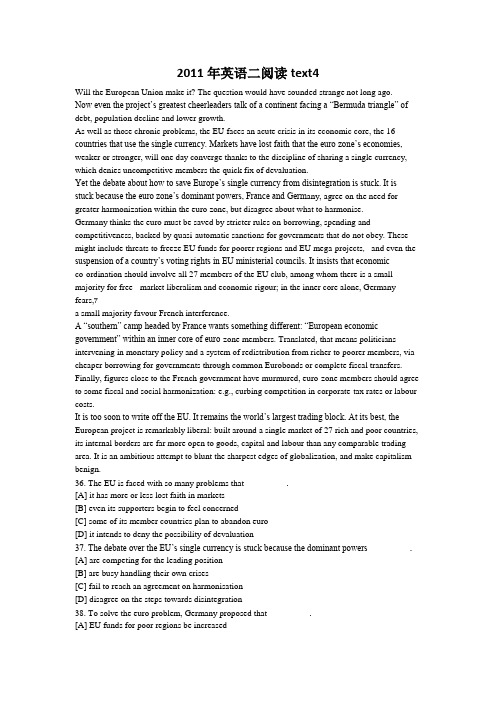
2011年英语二阅读text4Will the European Union make it? The question would have sounded strange not long ago.Now even the project’s greatest cheerleaders talk of a continent facing a “Bermuda triangle” of debt, population decline and lower growth.As well as those chronic problems, the EU faces an acute crisis in its economic core, the 16 countries that use the single currency. Markets have lost faith that the euro zone’s economies, weaker or stronger, will one day converge thanks to the discipline of sharing a single currency, which denies uncompetitive members the quick fix of devaluation.Yet the debate about how to save Europe’s single currency from disintegration is stuck. It is stuck because the euro zone’s dominant powers, France and Germ any, agree on the need for greater harmonization within the euro zone, but disagree about what to harmonise.Germany thinks the euro must be saved by stricter rules on borrowing, spending and competitiveness, backed by quasi-automatic sanctions for governments that do not obey. These might include threats to freeze EU funds for poorer regions and EU mega-projects, and even the suspension of a country’s voting rights in EU ministerial councils. It insists that economicco-ordination should involve all 27 members of the EU club, among whom there is a small majority for free - market liberalism and economic rigour; in the inner core alone, Germany fears,7a small majority favour French interference.A “southern” camp headed by France wants something different: “European economic government” within an inner core of euro-zone members. Translated, that means politicians intervening in monetary policy and a system of redistribution from richer to poorer members, via cheaper borrowing for governments through common Eurobonds or complete fiscal transfers. Finally, figures close to the French government have murmured, euro-zone members should agree to some fiscal and social harmonization: e.g., curbing competition in corporate-tax rates or labour costs.It is too soon to write off the EU. It remains the world’s largest trading block. At its best, the European project is remarkably liberal: built around a single market of 27 rich and poor countries, its internal borders are far more open to goods, capital and labour than any comparable trading area. It is an ambitious attempt to blunt the sharpest edges of globalization, and make capitalism benign.36. The EU is faced with so many problems that ________.[A] it has more or less lost faith in markets[B] even its supporters begin to feel concerned[C] some of its member countries plan to abandon euro[D] it intends to deny the possibility of devaluation37. The debate over the EU’s single currency is stuck because the dominant powers ________.[A] are competing for the leading position[B] are busy handling their own crises[C] fail to reach an agreement on harmonisation[D] disagree on the steps towards disintegration38. To solve the euro problem, Germany proposed that ________.[A] EU funds for poor regions be increased[B] stricter regulations be imposed[C] only core members be involved in economic co-ordination[D] voting rights of the EU members be guaranteed39. The French proposal of handling the crisis implies that ________.[A] poor countries are more likely to get funds[B] strict monetary policy will be applied to poor countries[C] loans will be readily available to rich countries[D] rich countries will basically control Eurobonds40. Regarding the future of the EU, the author seems to feel ________.[A] pessimistic[B] desperate[C] conceited[D] hopeful答案及解析:36. 【答案】B【解析】具体信息题。
【新祥旭考研】外刊赏读 《经济学人》In the hands of an angry God
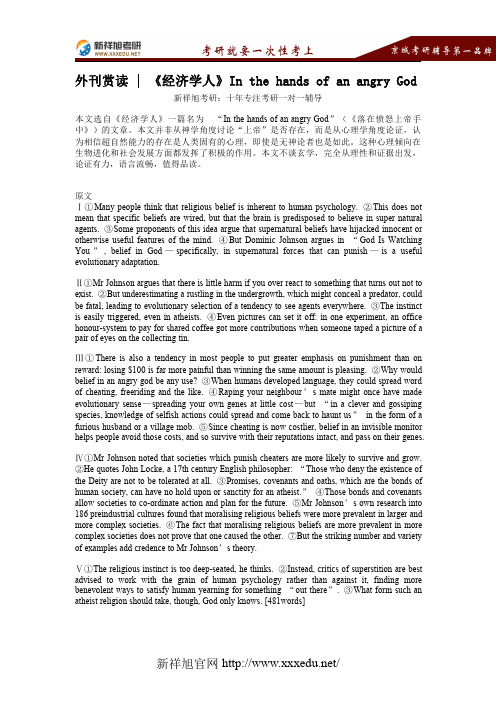
外刊赏读|《经济学人》In the hands of an angry God新祥旭考研:十年专注考研一对一辅导本文选自《经济学人》一篇名为“In the hands of an angry God”(《落在愤怒上帝手中》)的文章。
本文并非从神学角度讨论“上帝”是否存在,而是从心理学角度论证,认为相信超自然能力的存在是人类固有的心理,即使是无神论者也是如此。
这种心理倾向在生物进化和社会发展方面都发挥了积极的作用。
本文不谈玄学,完全从理性和证据出发,论证有力,语言流畅,值得品读。
原文Ⅰ①Many people think that religious belief is inherent to human psychology.②This does not mean that specific beliefs are wired,but that the brain is predisposed to believe in super natural agents.③Some proponents of this idea argue that supernatural beliefs have hijacked innocent or otherwise useful features of the mind.④But Dominic Johnson argues in“God Is Watching You”,belief in God—specifically,in supernatural forces that can punish—is a useful evolutionary adaptation.Ⅱ①Mr Johnson argues that there is little harm if you over react to something that turns out not to exist.②But underestimating a rustling in the undergrowth,which might conceal a predator,could be fatal,leading to evolutionary selection of a tendency to see agents everywhere.③The instinct is easily triggered,even in atheists.④Even pictures can set it off:in one experiment,an office honour-system to pay for shared coffee got more contributions when someone taped a picture of a pair of eyes on the collecting tin.Ⅲ①There is also a tendency in most people to put greater emphasis on punishment than on reward:losing$100is far more painful than winning the same amount is pleasing.②Why would belief in an angry god be any use?③When humans developed language,they could spread word of cheating,freeriding and the like.④Raping your neighbour’s mate might once have made evolutionary sense—spreading your own genes at little cost—but“in a clever and gossiping species,knowledge of selfish actions could spread and come back to haunt us”in the form of a furious husband or a village mob.⑤Since cheating is now costlier,belief in an invisible monitor helps people avoid those costs,and so survive with their reputations intact,and pass on their genes.Ⅳ①Mr Johnson noted that societies which punish cheaters are more likely to survive and grow.②He quotes John Locke,a17th century English philosopher:“Those who deny the existence of the Deity are not to be tolerated at all.③Promises,covenants and oaths,which are the bonds of human society,can have no hold upon or sanctity for an atheist.”④Those bonds and covenants allow societies to co-ordinate action and plan for the future.⑤Mr Johnson’s own research into 186preindustrial cultures found that moralising religious beliefs were more prevalent in larger and more complex societies.⑥The fact that moralising religious beliefs are more prevalent in more complex societies does not prove that one caused the other.⑦But the striking number and variety of examples add credence to Mr Johnson’s theory.Ⅴ①The religious instinct is too deep-seated,he thinks.②Instead,critics of superstition are best advised to work with the grain of human psychology rather than against it,finding more benevolent ways to satisfy human yearning for something“out there”.③What form such an atheist religion should take,though,God only knows.[481words]词汇短语1.wire[ˈwaɪəd]v.接通电源2.*predisposed[pri:dɪs'pəʊzd]adj.倾向于3.*proponent[prəˈpəʊnənt]n.支持者4.*rustling[ˈrʌslɪŋ]n.沙沙声5.honour-system无看守监禁制6.furious[ˈfjʊəriəs]adj.狂怒的7.*covenant[ˈkʌvənənt]n.协议8.hold upon控制力9.*sanctity[ˈsæŋktəti]n.神圣10.credence[ˈkri:dns]n.相信11.grain[greɪn]n.细粒12.*benevolent[bəˈnevələnt]adj.慈善的13.*yearning[ˈjɜ:nɪŋ]n.渴望(注:标*的为超纲词)点评Ⅰ①Many people think that religious belief is inherent to human psychology.②This does not mean that specific beliefs are wired,but that the brain is predisposed to believe in supernatural agents.③Some proponentsof this idea argue that supernatural beliefs have hijacked innocent or otherwise useful features of the mind.④But Dominic Johnson argues in“God Is Watching You”,belief in God—specifically,in supernatural forces that can punish—is a useful evolutionary adaptation.翻译:很多人认为,宗教信仰是人类心理固有的。
- 1、下载文档前请自行甄别文档内容的完整性,平台不提供额外的编辑、内容补充、找答案等附加服务。
- 2、"仅部分预览"的文档,不可在线预览部分如存在完整性等问题,可反馈申请退款(可完整预览的文档不适用该条件!)。
- 3、如文档侵犯您的权益,请联系客服反馈,我们会尽快为您处理(人工客服工作时间:9:00-18:30)。
女孩从小就被教导要避免失败,规避风险。要微笑得体,谨慎行事,门门优秀。而在另一方面,男孩却被教导要玩得粗野,荡到高空,爬上猴架顶端,再纵身跃下。
当他们成年之时,男性习惯于不断冒险,无论是要求加薪还是约某人出去,他们的冒险也时常得到回报。在硅谷人们常说倘若没经过两次创业的失败,没人会把你当回事。换言之,我们教育女孩要完美无缺,而教导男孩学会勇敢。
Most girls are taught to avoid failure and risk. To smile pretty,play it safe, get all A’s. Boys, on the other hand, are taught to play rough, swing high, crawl to the top of the monkey bars and then jump off head first.
By the time they’re adults and whether they’re negotiating a raiseБайду номын сангаасor even asking someone out on a date, men are habituated to take risk after risk. They’re rewarded for it. It’s often said inSilicon Valleythat no one even takes you seriously unless you’ve had two failed startups. In other words, we’re raising our girls to be perfect and we’re raising our boys to be brave.
有人担忧我们的联邦赤字,但我却忧心我们的勇气赤字。正因为我们没有教导女孩们学会勇敢,我们的经济,我们的社会才会不景气。我们的勇气赤字是导致在科学技术与工程数学领域,在高层管理人士中,在会议室里,在国会里,乃至任何所见之处都缺乏女性的原因。
So many women that I talk to tell me that theygravitatetowards careers or positions that they know they’re going to be great in, that they know they’re going to be perfect in. And it’s no wonder why.
Some people worry about our federal deficit. But I worry about our bravery deficit. Our economy, our society, we’re losing out because we’re not raising our girls to be brave. The bravery deficit is the reason why women are underrepresented in STEM, in C-suites, in boardrooms, in Congress, and pretty much everywhere you look.
